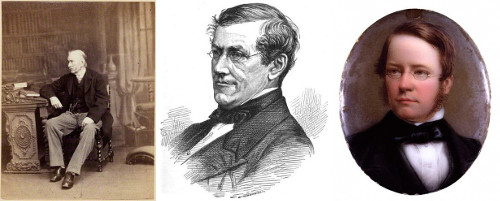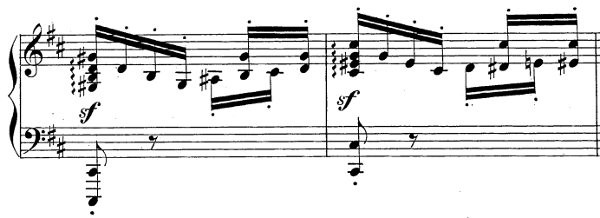
Draw three circles, each of which intersects the other two at two points, and connect these points of intersection as shown.
Now, neatly, ace/bdf = 1.
Discovered by University of Waterloo mathematician Hiroshi Haruki.

Draw three circles, each of which intersects the other two at two points, and connect these points of intersection as shown.
Now, neatly, ace/bdf = 1.
Discovered by University of Waterloo mathematician Hiroshi Haruki.
A bit more on philosophy and time travel: It seems consistent to suppose that a time traveler can affect the past but not change it. Perhaps I will invent a time machine tomorrow and race heroically back to 1865 to save Lincoln from John Wilkes Booth. I might arrive at Ford’s Theater and race up to Lincoln’s box; I might even wrestle dramatically with Booth in the hallway. But we know in advance that I won’t be successful, because history tells us that Booth did shoot Lincoln that night.
This way of looking at it entails no paradoxes, but it does create a problem. If time travel is possible then presumably hundreds of well-intentioned time travelers converged on Lincoln’s box that night, all determined to save the president and all somehow slipping on banana peels at the wrong moment. This is not impossible, but it seems terrifically unlikely — so much so that the very fact of Lincoln’s death seems to imply that time travel is not possible.
But University of Sydney philosopher Nicholas J.J. Smith points out that we don’t quite know this: A time machine may be invented a century from now with a backward range of only 50 years. In that case we have no experience from which to judge these matters. “One cannot conclude from the supposition that local backward time travel would bring with it what we ordinarily regard as improbable coincidences, that such time travel will occur only rarely: for the only reason we regard the events in question as improbable coincidences is that within our experience, they have not occurred very often — and our experience does not (apparently) encompass backward time travel.”
(Nicholas J.J. Smith, “Bananas Enough for Time Travel?”, The British Journal for the Philosophy of Science, September 1997.)
From a 1951 issue of The Dark Horse, the staff magazine of Lloyds Bank, a bitter mnemonic for pi:
Now I live a drear existence in ragged suits
And cruel taxation suffering.
3.141592653589
Also, a curiosity:
(3,1,4) = (1,5,9) + (2,6,5) (mod 10)
(Thanks, Trevor.)
“There is nothing so easily made offensive as good reasoning.” — Sir Arthur Helps

The Wheatstone bridge circuit was invented by Samuel Hunter Christie but named after Charles Wheatstone, who developed the Playfair cipher … which was named after Lyon Playfair.
See Who’s On First?
advolution
n. a rolling toward
“The ball was my idea,” said Steven Spielberg of the boulder that threatens Indiana Jones at the start of Raiders of the Lost Ark. “I don’t even know where I came up with it — it might have been deeply in my subconscious from something I saw when I was a kid — but I just said, ‘You know, at some point some huge boulder should start chasing Indy, and it almost squashes him three or four times until he gets out of the cave.'”
The scene was shot 10 times, with the crew replacing fallen stalactites each time. “I didn’t know it was gonna look as good as it did until the day [production designer] Norman Reynolds showed me that he had actually made a boulder that was something like 22 feet in circumference,” Spielberg said. “So I didn’t have Harrison step in the shot until I was completely convinced it was safe. Once we’d rehearsed it several times with a stuntman, Harrison did every shot himself.”
When Spielberg, George Lucas, and screenwriter Lawrence Kasdan had met in January 1978 to brainstorm ideas, it was quickly clear that Lucas already had an articulate vision of the story. At one point Kasdan asked Lucas why he didn’t direct the film himself. He said, “Because then I’d never get to see it.”
(From J.W. Rinzler, The Complete Making of Indiana Jones, 2008.)

This unit square is divided into four regions by a diagonal and a line that connects a vertex to the midpoint of an opposite side. What are the areas of the four regions?

In 1768, Catherine the Great ordered her subjects to move a 3-million-pound granite boulder intact into Saint Petersburg to serve as the pedestal for a statue of Peter the Great. In this episode of the Futility Closet podcast we’ll learn how some inspired engineering moved the Thunder Stone 13 miles from its forest home to Senate Square, making it the largest stone ever moved by man.
We’ll also learn whether mutant squid are attacking Indiana and puzzle over why a stamp collector would be angry at finding a good bargain.

The story of a musical misprint, with perhaps a moral:
A student whom Dr Goldovsky describes as ‘technically competent but a poor reader’ prepared a Brahms Capriccio (Op. 76 No. 2) which she brought to her lesson. She began to play the piece through but when she arrived at the C sharp major chord on the first beat of the bar 42 measures from the end, she played a G natural instead of the G sharp which would normally occur in the C sharp major triad. Goldovsky told her to stop and correct her mistake. The student looked confused and said that she had played what was written. To Goldovsky’s surprise, the girl had played the printed notes correctly — there was an apparent misprint in the music.
The error occurred in most published editions of the piece; hundreds of musicians had overlooked it. Goldovsky tested his skilled readers by telling them that the piece contained a misprint and asking them to find it. He allowed them to play the piece as many times as they liked, but none found the error. Only when he specified the measure were they able to see it.
The misprint is hard to spot because the bar in which it occurs is almost an exact transposition of the preceding bar. The underlying harmony is the very common V-I (G sharp to C sharp) over a C sharp pedal, and the notation in the preceding bar has already “set” the G as a sharp. So there are multiple, powerful cues for an experienced player to interpret the subsequent G as sharp.
“What is important to note about this story is that it was a relatively poor reader who was the first to uncover the error,” notes John Sloboda in The Musical Mind (1988). “Because she did not have the expectations of more accomplished players she required more information from the score to determine her performance, and so, paradoxically, read more accurately than more accomplished players.”
(Thomas Wolf, “A Cognitive Model of Musical Sight-Reading,” Journal of Psycholinguistic Research, April 1976.)